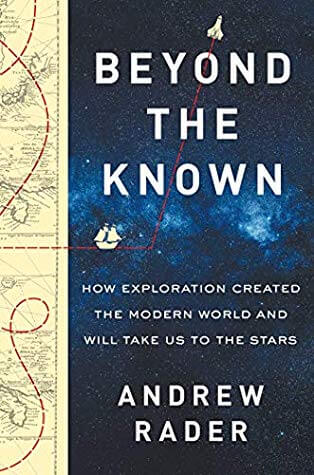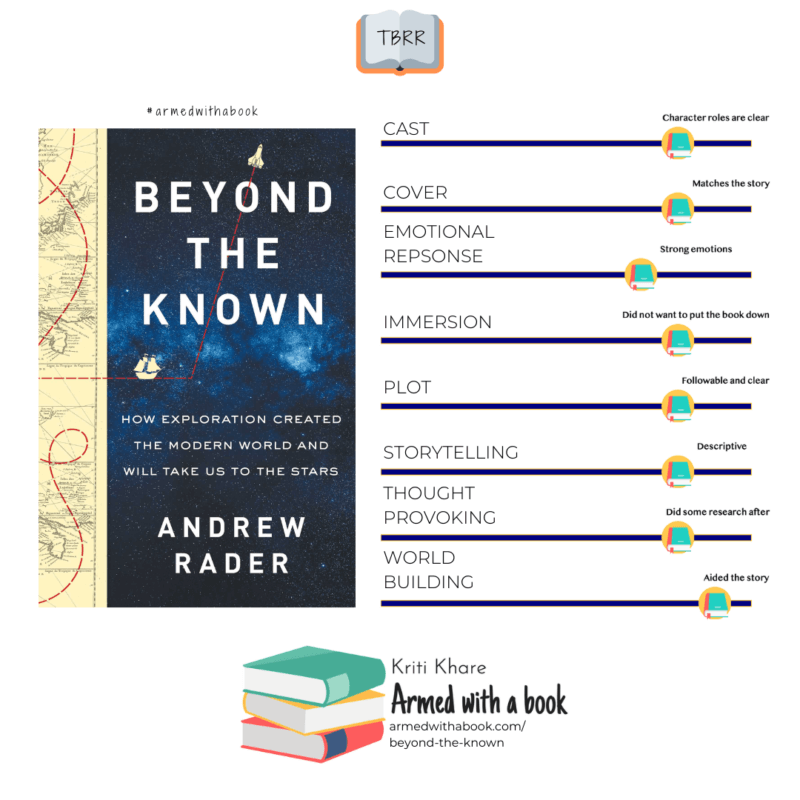
It’s finally time to tell you about the most mesmerizing read of 2019 – the last book of that decade for me which I could not put down! If you are someone who is fascinated by the history of the world, this is a book for you. All the snippets of information that you learned during history classes in school will come together in your mind to form the big picture. To me, many secrets were revealed and almost everything that I read blew my mind. There is so much I want to say about this book so without further ado, let’s start with the synopsis.
For the first time in history, the human species has the technology to destroy itself. But having developed that power, humans are also able to leave Earth and voyage into the vastness of space. After millions of years of evolution, we’ve arrived at the point where we can settle other worlds and begin the process of becoming multi-planetary. How did we get here? What does the future hold for us?
Divided into four accessible sections, Beyond the Known examines major periods of discovery and rediscovery, from Classical Times, when Phoenicians, Persians and Greeks ventured forth; to The Age of European Exploration, which saw colonies sprout on nearly continent; to The Era of Scientific Inquiry, when researchers developed brand new tools for mapping and traveling farther; to Our Spacefaring Future, which unveils plans currently underway for settling other planets and, eventually, traveling to the stars.
A Mission Manager at SpaceX with a light, engaging voice, Andrew Rader is at the forefront of space exploration. As a gifted historian, Rader, who has won global acclaim for his stunning breadth of knowledge, is singularly positioned to reveal the story of human exploration that is also the story of scientific achievement. Told with an infectious zeal for traveling beyond the known, Beyond the Known illuminates how very human it is to emerge from the cave and walk toward an infinitely expanding horizon.
Why I chose to read Beyond the Known
Why does anyone choose a non-fiction book? What curiosities are we trying to quench as readers that non-fiction authors are able to provide a window into? I found Beyond the Known on a list of highly anticipated Fall 2019 books and took my search to NetGalley to see if I could read it. Many thanks to Simon and Schuster who approved my request, and Andrew for writing this book, as they allowed me to go on a journey back in time and then back to the present and the future, without leaving the comforts of my home.
I have always been fascinated by history and did not realize how much I wanted it all to play out like a movie in my mind until I read about this book. When we learn history in school, it is usually very centered around the country we live in. My education in India was no different and while many of my years were full of the happenings in South Asia in general, and India in particular, in the 1900s (those are the years I clearly remember), a lot about the foundations of civilizations has long escaped my memory as I have grown older. This book was the perfect way to learn more! And I was not disappointed.
Themes for Thought
Beyond the Known begins at the very beginning, when our ancestors were still in Africa. It goes all the way into the time humans landed on the moon and how we might go forward. Andrew did an amazing job of putting together a volume of history that touches on the whole world. You won’t find the details of everything in this book, but you will learn many little things that you might not have known before. Many of the curiosities that I had as I read the book were answered in subsequent chapters and I was quite impressed with that.
On Genetics
I will be honest, I did not know about the multiple species of humans. Or maybe I did and it has long been lost in the many other pieces of information that my mind houses. Through this book, I learned about the travels of the first humans, their treks across the oceans and continents, as well as the inventions that helped them explore and survive. What was most fascinating was as I progressed thorough history, I learned that people from North America – North American Indians – come from a very small pool of ancestors and did not have the same kind of genetic diversity that is seen in densely populated areas of the world, like Asia and Europe. This is why diseases that foreign explorers introduced to this side of the world became rampant epidemics.
Similar to not knowing about multiple human species, and being new in North America itself (I have called Canada my home for only 5ish years now), there is much I am still to learn about North American Indians, the First Nations culture and more. Beyond the Known touched on many of the questions I did not even know I had and I have come out of this book, with some more information, and of course, more questions to learn more about. 🙂
I want to add here that Andrew mentioned that oral histories are no less than written histories and I highly appreciated this comment. Just because some cultures choose to pass on knowledge in a certain way does not make them any less than other cultures.
On Societies – Travels and Structure
We can definitely recount some exploits of ancient people and guess about others, but we can never know with certainty the full magnitude of their achievements.
Andrew Rader in Beyond the Known
I have read about many ancient civilizations, Ancient Egypt being the focus of my attention for a good half decade as a teenager. Though I am sure we compared and contrasted them all in history and geography assignments, I never thought about why certain civilizations built and didn’t explore while others just explored and explored!
Remember Cleopetra?
The pyramids were older to Cleopatra than Cleopatra is to us, built over 4,500 years ago at a time when woolly mammoths still walked the Earth.
Andrew Rader in Beyond the Known
Wait… mammoths existed when the pyramids were being built? Mind blown all over again.
Egypt has one of the most impressive societal structures in my mind and I am referring to the fact that queens existed without kings. Women were allowed to be in powerful positions. Cleopatra, Hatsheput, Nefertiti. They might have been placeholders for their sons, the to-be pharaohs, but that does not mean they were not in leadership positions. There is a reason their names are well known in history, and anyone who learns about Ancient Egypt, learns their names.
Another society that I learned about was the Vikings. Their women had rights too – to divorce, to own a business, to name a few. The men were warriors and raiders and the women were fighters because when the men were gone, they were all that were left to defend the families.
It is always empowering to think about these cultures of old and then put them into perspective of how much women in modern times had to struggle for voting and ownership rights. Indeed, with time, we lost a lot of knowledge we gained.
Learning from ourselves
Towards the end of the book, Andrew talks about Antarctica and how it came to be the only place on our planet which is freely accessible to all nations. He mentions how this is an important insight into how we would likely deal with off-Earth claims as well when we do get to Mars and Jupiter, places that could be habitable for humans. No country would be able to claim them because they reached there first (there was a race to Antarctica too after all), and the best scientific minds might as well unite to learn more about these regions than engage in power struggles.
Beyond the Known is the only book in my memory so far that took me to the depths of the unknown, things I had known but hadn’t pondered for long on before. This is a book I will go back to time and time again when I am looking for some inspiration about not just mankind but also the things we have accomplished and the things we are capable of.
** Beyond the Known: How Exploration Created the Modern World and Will Take Us to the Stars is now out in stores so get a copy and let me know what you think! **
Amazon Print
Amazon Kindle

I will be sharing my interview with Andrew Rader in the coming weeks so stay tuned for that! 🙂 Thanks for stopping by!
Cover image: Photo by Jeremy Thomas on Unsplash

Thanks for this one Kriti!! Adding it to my list!